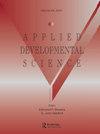关心学校氛围和心理健康的认知:单行道?随机截距交叉滞后面板模型的结果
IF 1.5
3区 心理学
Q3 PSYCHOLOGY, DEVELOPMENTAL
引用次数: 1
摘要
我们调查了挪威高中生对关怀学校氛围和心理健康的感知之间的纵向关系,以及社会经济地位(SEP)在这些结构中的作用(N = 1508;60.7%的女孩)。使用随机截距交叉滞后面板模型,我们发现关怀学校氛围的感知与心理健康之间在水平之间和水平内部都存在正相关,并且在所有时间点上,从心理健康到后来对关怀学校氛围的感知,在人的层面上存在正交叉滞后效应。SEP在第一时间与心理健康呈正相关,在所有时间点与关怀学校氛围的感知呈正相关。研究结果表明,心理健康是挪威青少年如何感知他们的学校环境的一个重要因素,并强调了学校工作人员特别关注那些与心理健康作斗争的学生的重要性,以及那些低SEP的学生。本文章由计算机程序翻译,如有差异,请以英文原文为准。
Perceptions of a caring school climate and mental well-being: a one-way street? Results from a random intercept cross-lagged panel model
We investigated the between- and within-person longitudinal relationship between perceptions of a caring school climate and mental well-being, and the role of socioeconomic position (SEP) for these constructs among high school students in Norway (N = 1508; 60.7% girls). Using a random intercept cross-lagged panel model, we found positive concurrent associations between perceptions of a caring school climate and mental well-being at both between and within levels, and positive cross-lagged effects at the within-person level from mental well-being to later perceptions of a caring school climate across all time points. SEP was positively associated with mental well-being at time one, and at all time points with perceptions of a caring school climate. The findings suggest that mental well-being is a significant contributor to how Norwegian adolescents subsequently perceive their school context, and underscore the importance of school staff being particularly attentive toward students who struggle with mental health, as well as those with lower SEP.
求助全文
通过发布文献求助,成功后即可免费获取论文全文。
去求助
来源期刊

Applied Developmental Science
PSYCHOLOGY, DEVELOPMENTAL-
CiteScore
12.00
自引率
2.60%
发文量
23
期刊介绍:
The focus of this multidisciplinary journal is the synthesis of research and application to promote positive development across the life span and across the globe. The journal publishes research that generates descriptive and explanatory knowledge about dynamic and reciprocal person-environment interactions essential to informed public dialogue, social policy, and preventive and development optimizing interventions. This includes research relevant to the development of individuals and social systems across the life span -- including the wide range of familial, biological, societal, cultural, physical, ecological, political and historical settings of human development.
 求助内容:
求助内容: 应助结果提醒方式:
应助结果提醒方式:


